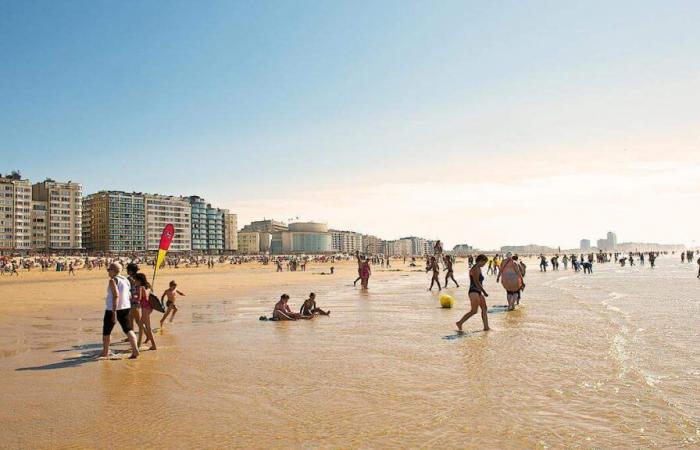The tensions between Flemish and Francophones at the Belgian coast are experiencing a new chapter with the recent declarations of Jean-Marie Dedecker, the bourgmestre of Middelkerke. In the columns of the French -speaking daily The last hourthe agent says he is ready to welcome everyone, but recalls “that we must keep the right manners”. Residents of La Panne, for their part, point to young Francophones ignoring what a trash is. On the seaside, those in the south would be less well than those in the North …
Bis repetita. Because in 2024, the same Jean-Marie Dedecker had explicitly attributed the problems of cleanliness of the seaside resorts to certain populations: “Many people also come from cultures which do not respect our common goods, who think that the beach of Ostend or our beaches are like those of Mogadiscio or Dakar”. He had added these particularly controversial words: “It is a can from Molenbeek that is thrown on the beach. You have to dare to say it ”.
Previously, the ex-coach of the national judo team had affirmed on the private channel RTL-TVI That French -speaking tourists are “more than welcome” to the coast, adding with the characteristic franchise that goes hand in hand with its man’s air: “bring a little cash for our merchants”.
Facies and fridge box box
These successive declarations concentrate the reproaches conventionally addressed to French speakers who frequent the coast, a fortiori if they are found en masse as in recent days. But not all Francophones … Young people from Brussels districts with high Arab-Muslim density are more particularly targeted, taxed to dirty the beaches of the Vlaamse Kust and to sow disorder. In order not to fix anything, they are assimilated to tourists for a day, equipped with a fridge box, blamed not to spend money in local shops.
In the Flemish political galaxy, Jean-Marie Dedecker is UFO. His outspokenness serves the theses very to the right of his “lijst”. In June 2024, he presented himself in the legislative elections under the colors of the Flemish nationalist N-VA of Bart de Wever, the current Prime Minister. Elected deputy for Flanders-Western, he has resumed since his independence.
“The cyclists take the whole road and refuse to depart”
As should be expected, Jean-Marie Dedecker’s media outings sparked a volley of reactions on radios and French-speaking social networks.
Here, Flemish tourists are criticized for “believing themselves to be permitted, of speaking Dutch without any consideration for their interlocutors” when they spend their holidays in the Ardennes. “The cyclists take the whole road and refuse to depart”.
There, there are Francophones to fly to the aid of the bourgmestre of Middelkerke: “When I see the behavior of some at the coast, I am ashamed to be French -speaking”, testifies a lady. She considers that “Dutch speakers have a more anchored culture of cleanliness” and that “Francophones have a lot to learn from Dutch speakers, and not only at the level of good manners”. Stereotypes have a hard life.
In reality, each tourist season brings its share of community tensions to the seaside where we speak less and less the language of the other. The most critical episode undoubtedly remains the clashes that opposed, in Blankenberge in August 2020, around forty young people “almost all from Brussels” in the police in the context of compliance with COVVID rules. This confrontation, relayed by social networks, had taken on a national political dimension. The Minister of the Interior of the time, the Christian Democrat Pieter de Crem, had to defend his policy in the Chamber, stressing that the number of additional police officers dispatched to Blankenberge had been tripled.
This brawl and its impact were exploited by the Flemish far right. The Vlaams Belang presented the troublemakers as “immigration descendants from Brussels to sow panic on the coast”. The young Brussels “allochthonous” were accused of seeking fight in the Flemish swimming pools.
French -speaking customers must be pampered
Fortunately, this type of incident remains anecdotal and the tourist industry on the coast only asks to welcome French speakers to round its turnover. As part of its new strategy, Westtoer-the provincial agency responsible for tourism development in Flanders-Western-multiplies initiatives to attract Walloons and Brussels residents to the Belgian coast. With the “sea fashion” campaign, the accent is on emotion, childhood memories and well-being that a stay by the sea and winter provides. This emotion is first of all that of Francophones who, very often, “saw the sea” for the first time between the breakdown and Knokke while they were still wearing short pants.
French -speaking Belgians represent almost 23% of visitors to the coast, alone generating some 800 million euros in annual turnover. Westtoer logically seeks to strengthen this attendance outside of high season periods.
Among the flagship initiatives, the “Masterpieces of the sea” campaign invites visitors to discover more than 50 works of contemporary art exhibited outdoors, along the coastline.
Westtoer also encourages local merchants to take French lessons. Finally, unprecedented collaborations, such as the partnership between the coast and the tourist federation of the province of Luxembourg, aim to pool promotion efforts and to offer an additional offer between sea and Ardenne.
Between identity tensions and economic strategy, the Belgian coast remains a field of fragile cohabitation, but essential for the tourist and social unit of the country.






